
Unlocking the Potential of Wool: Your Guide to Quality Fiber Processing
From Raw Fiber to Refined Fabric: Educating the World on Wool's Versatility
Explore Our Educational Resources
From Raw Fiber to Refined Fabric: Educating the World on Wool's Versatility
Explore Our Educational Resources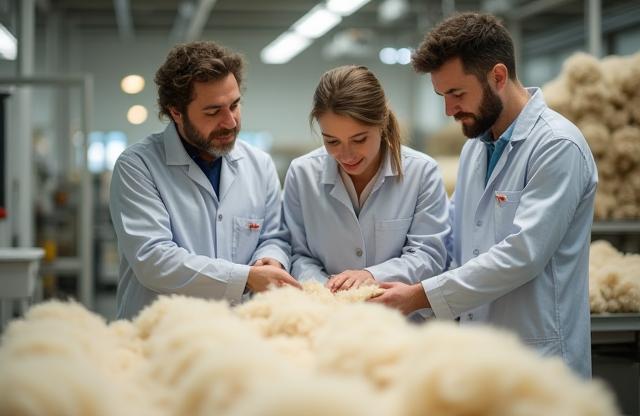
Founded over two decades ago, Gulf Fibers & Textiles emerged from a deep appreciation for the natural qualities of wool and a vision to become a leading provider of high-quality textile fibers in the Middle East and beyond. Strategically located in Dubai's dynamic industrial hub, our facility is equipped with state-of-the-art machinery and staffed by a team of experienced professionals dedicated to the craft of wool processing. Our journey began with a commitment to ethical sourcing and has grown into a comprehensive operation covering every stage from raw fiber to refined fabric. We believe in building lasting relationships with our suppliers and customers, fostering transparency and trust throughout the supply chain.
Our mission is not only to deliver premium wool products but also to serve as an educational resource for the industry and consumers alike. We are passionate about highlighting the inherent benefits of wool – its sustainability, durability, comfort, and versatility. Through continuous research and innovation, we strive to improve our processes, minimize environmental impact, and uphold the highest standards of quality. We are proud of our heritage in textile manufacturing and are constantly looking towards the future, exploring new techniques and applications for this incredible natural fiber. Our team is a diverse group of experts, each contributing their unique skills and knowledge to ensure every batch of wool processed meets our rigorous standards. From the initial inspection of raw bales to the final quality check of finished yarn or fabric, precision and care are paramount. This dedication to excellence defines Gulf Fibers & Textiles.
Our mission is to be the trusted source for premium wool textiles, driving innovation, sustainability, and education within the global fiber industry.
We handle the complete journey of wool fiber. Explore our core services:
Our commitment to quality begins at the source. We meticulously select raw wool from reputable farms and global partners who adhere to the highest standards of animal welfare and sustainable land management. Each bale is inspected for fiber characteristics, cleanliness, and origin traceability, ensuring we start with only the finest raw materials that align with our ethical principles.
Utilizing advanced, environmentally conscious scouring processes, we gently and effectively remove lanolin, dirt, vegetable matter, and other impurities from the raw wool. Our state-of-the-art cleaning lines are designed to preserve the natural integrity and softness of the fiber, resulting in a clean, bright wool ready for the next stages of processing while minimizing water usage and treating wastewater responsibly.
After cleaning, the wool undergoes carding, a mechanical process that disentangles the fibers and aligns them into a continuous, uniform web called a sliver. This prepares the fibers for spinning. Our skilled technicians and precision machinery then spin the sliver into strong, consistent yarns of various counts and structures, tailored to specific customer requirements for knitting or weaving applications.
Beyond basic spinning, we specialize in producing a diverse portfolio of wool yarns. This includes fine yarns for lightweight apparel, robust yarns for upholstery and carpets, and specialty yarns with unique textures or blends. Our production capabilities allow us to meet the varied needs of the textile industry, always focusing on yarn strength, evenness, and desired aesthetic qualities for optimal performance in downstream manufacturing.
Our weaving facilities transform high-quality wool yarns into a wide array of woven fabrics. From classic twills and plains to complex dobby and jacquard patterns, we produce fabrics suitable for applications ranging from high-fashion apparel and tailored suits to durable home furnishings and technical textiles. We work closely with clients to achieve the desired weave structure, density, and hand-feel for their specific end-use.
We offer comprehensive dyeing services using a spectrum of high-quality dyes, ensuring excellent color fastness and depth while adhering to environmental regulations. Our finishing processes, which can include washing, fulling, pressing, brushing, or napping, are meticulously applied to enhance the fabric's texture, drape, dimensional stability, and overall performance characteristics, delivering fabrics that meet exacting specifications.
As a key player in the textile supply chain, Gulf Fibers & Textiles provides efficient and reliable wholesale distribution of our processed wool fibers, yarns, and fabrics. With robust logistics and a global network, we ensure timely delivery to manufacturers, designers, and retailers worldwide, supporting their production schedules and inventory needs with consistently high-quality wool products.
Understanding that specific applications may require unique properties, we offer custom fiber blending services. We can combine wool with other natural or synthetic fibers like silk, cashmere, nylon, or polyester to create blends that achieve desired characteristics such as enhanced strength, softness, wrinkle resistance, or cost-effectiveness, collaborating with clients to develop bespoke fiber solutions.
Understand the intricate steps that bring raw wool to life as beautiful textiles. Each stage requires expertise and precision to unlock wool's full potential.
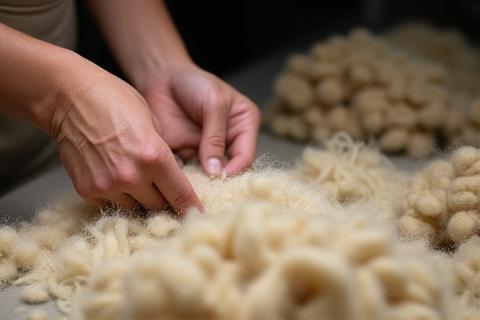
The process begins long before the wool reaches our facility. We partner with trusted farms globally, focusing on ethical practices and the health of the sheep. Upon arrival, experienced graders meticulously assess the raw wool based on crucial characteristics such as micron count (fiber diameter), staple length (fiber length), strength, crimp, and color. This initial grading is vital for sorting the wool into batches suitable for different end-uses and processing methods, ensuring consistency and quality from the very start.
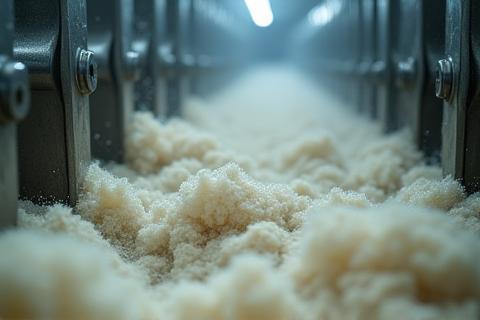
Raw wool contains impurities like grease (lanolin), sweat, dirt, and vegetable matter. Scouring is the washing process that removes these. We employ modern, multi-stage washing baths using biodegradable detergents and controlled temperatures to thoroughly clean the fibers without damaging them. After scouring, the wool is carefully dried using methods that maintain its natural structure and elasticity, preparing it for the mechanical processes that follow.
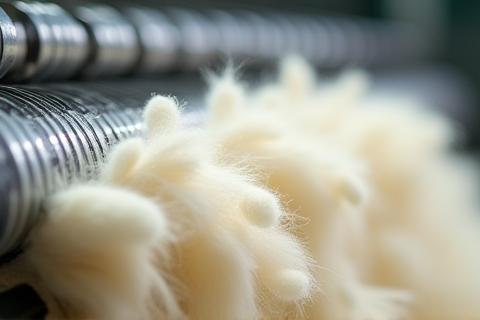
Carding is a crucial step where the cleaned, dried wool fibers are teased and separated by passing them through rollers covered in fine wire teeth. This process disentangles the fibers, removes any remaining vegetable matter, and begins to align them parallel to each other, forming a continuous, fluffy rope known as a 'sliver' or 'rovings'. Carding is essential for creating an even and consistent material ready for spinning.
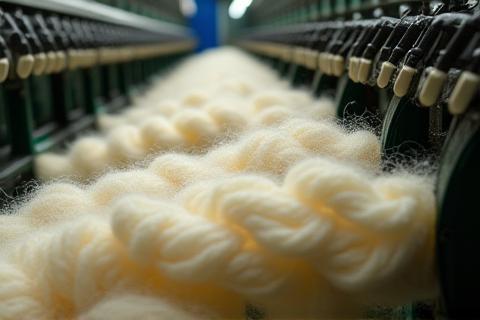
Spinning transforms the carded sliver into yarn. This involves drawing out the fibers and twisting them together to give the yarn strength, elasticity, and structure. The amount of twist applied determines the yarn's properties, such as its strength and texture. Our modern spinning frames allow for precise control, enabling us to produce yarns of varying thicknesses (counts) and plies to meet specific textile manufacturing needs.
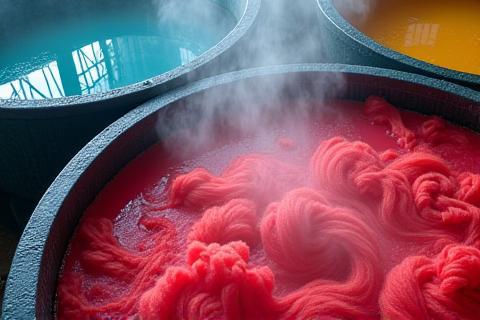
Color is added to the wool at various stages: as raw fiber ('stock dyeing'), after carding ('top dyeing'), or most commonly, after spinning ('yarn dyeing'). We use a range of high-quality dyes, including environmentally friendly options, applied in controlled conditions to ensure vibrant, consistent colors with excellent fastness. Our dyeing processes are managed to minimize water usage and chemical impact, aligning with our sustainability goals.
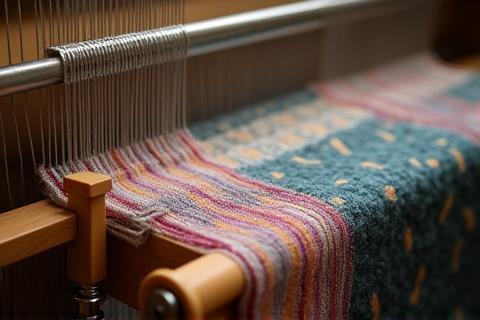
The spun and potentially dyed yarn is then transformed into textile structures. Weaving involves interlacing two sets of yarns (warp and weft) at right angles on a loom to create woven fabric. Knitting involves looping yarns together to create knitted fabric. Our facilities are equipped with modern looms and knitting machines capable of producing a wide variety of fabric types, from lightweight woolens to dense worsteds, depending on the intended use.
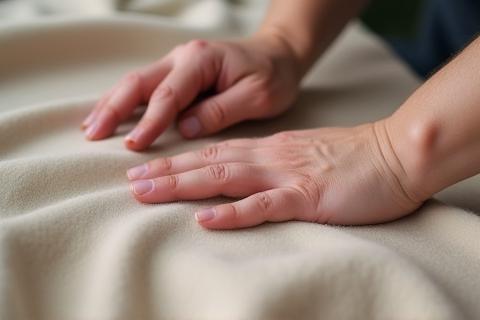
The final stage involves a series of treatments to give the fabric its desired handle, appearance, and performance characteristics. Finishing processes for wool can include washing, milling (fulling) to shrink and felt the fabric, pressing to smooth it, cropping or shearing to remove surface fibers, and brushing or napping to raise a soft pile. These steps are critical in achieving the specific quality standards required for different applications.
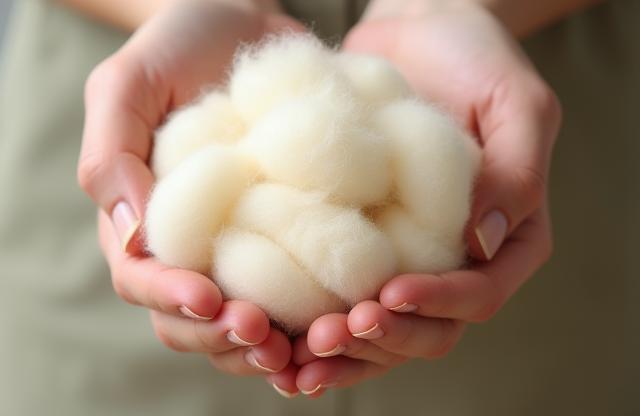
At Gulf Fibers & Textiles, quality and sustainability are not just buzzwords; they are the bedrock of our operations. We understand that producing exceptional wool textiles goes hand-in-hand with respecting the environment and upholding ethical standards. From the vast landscapes where our wool originates to our advanced processing facility in Dubai, we maintain rigorous controls to ensure excellence and responsibility at every step. Our dedication is reflected in our adherence to stringent international quality management systems, ensuring consistency and reliability for our clients globally.
We are deeply committed to minimizing our environmental footprint. This involves implementing water-saving technologies in our scouring processes, optimizing energy consumption throughout our plant, and engaging in responsible waste management practices, including the recycling of waste fibers and careful handling of wastewater. Furthermore, our ethical sourcing policy prioritizes partnerships with suppliers who demonstrate strong commitments to animal welfare, ensuring the sheep are treated humanely, and to fair labor conditions for all involved in the supply chain. Traceability is key; we strive to know the origin of our fibers, providing transparency and assurance to our customers about the journey of their wool. This holistic approach ensures that our pursuit of quality enhances, rather than detracts from, environmental health and social equity.
Wool is more than just a fiber; it's a sustainable, versatile material with remarkable properties that make it a superior choice for textiles across numerous applications, offering unparalleled comfort, durability, and environmental benefits.
Wool is a fleece grown by sheep, which regrows every year. This makes it a naturally renewable resource, harvestable without harming the animal or depleting finite resources, standing in contrast to many synthetic fibers.
Unlike synthetic fibers that persist in the environment for centuries, wool is a protein-based fiber that naturally decomposes in soil within a matter of years, releasing valuable nutrients back into the earth as it breaks down, contributing to a circular economy.
Wool fibers can absorb significant amounts of moisture vapor and then release it, facilitating breathability. This unique property allows wool textiles to effectively regulate body temperature, keeping you warm in cold conditions and cool in warm conditions by adapting to environmental changes.
Wool fibers are naturally hydrophilic inside but hydrophobic outside. They can absorb up to 30% of their weight in moisture without feeling damp, effectively wicking sweat away from the skin and into the fiber structure, where it can evaporate, enhancing comfort during physical activity.
Wool fibers possess a natural crimp and elasticity, allowing them to be bent and stretched thousands of times without breaking. This inherent resilience means wool fabrics resist wear and tear, retain their shape well, and are less prone to wrinkling, making them exceptionally durable and long-lasting.
Wool has a naturally high ignition temperature and a high limiting oxygen index, meaning it requires more oxygen to burn than many other fibers. When exposed to flame, it tends to char and extinguish itself rather than melting or dripping, offering inherent fire resistance without chemical treatments.
Wool's complex fiber structure traps odor-causing bacteria, preventing them from multiplying and producing smells. The moisture-wicking property also keeps the skin drier, further inhibiting bacterial growth. This makes wool apparel ideal for prolonged wear, requiring less frequent washing.
Contrary to popular belief, wool is generally well-tolerated by sensitive skin. Its natural properties make it resistant to dust mites, mold, and bacteria, common triggers for allergies. Modern processing techniques also produce finer wools that are soft and non-irritating, suitable for a wide range of individuals.
Deepen your understanding of wool processing, sustainability, and the fiber itself. Explore our collection of informative articles, guides, and frequently asked questions, compiled by our experts to share the fascinating world of wool.
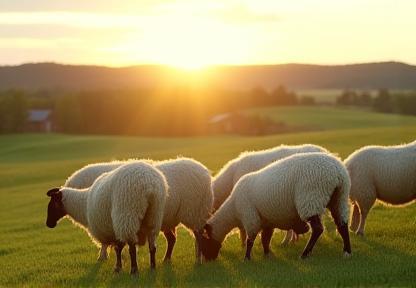
Delve into the critical practices that ensure wool is sourced responsibly. This guide covers ethical farming, animal welfare standards, environmental conservation on sheep farms, and key certifications to look for in the global wool market. Understand how mindful sourcing contributes to the overall quality and sustainability of the final textile product.
Type: Article/Guide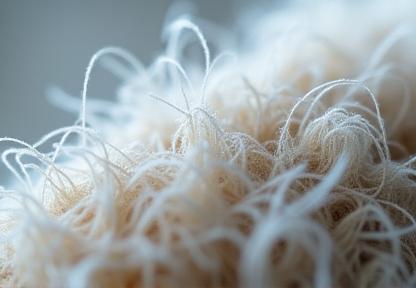
Fiber diameter, measured in microns, is one of the most significant factors determining wool's quality, feel, and suitability for different applications. This technical overview explains what micron count is, why it matters, and how it influences properties like softness, drape, and spinning potential. Learn how different micron ranges are used in textiles, from ultra-fine merino for apparel to coarser wools for carpets.
Type: Article/Guide
Explore the environmental considerations in transforming raw wool into textiles. This article discusses the energy and water usage in scouring and dyeing, the impact of chemicals, and strategies for reducing waste and emissions. We detail Gulf Fibers & Textiles' specific initiatives and investments in cleaner technologies and responsible practices to minimize our ecological impact and contribute to a healthier planet.
Type: Article/Guide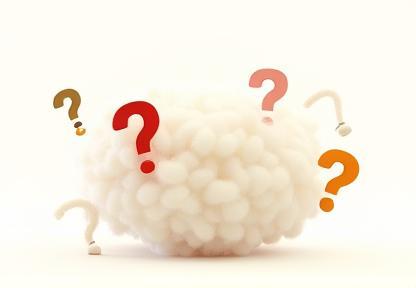
Find quick answers to some of the most frequently asked questions about wool, its properties, care, and processing. This section provides concise, informative responses to common queries, making complex topics easily accessible. While this display shows the answers directly, on a live site, these would typically be in expandable sections for clarity.
A: Yes, wool is a natural, renewable, and biodegradable fiber harvested from sheep annually, making it an inherently sustainable textile choice compared to synthetic alternatives derived from fossil fuels.
A: The standard process involves several key stages: sourcing/grading the raw wool, scouring (cleaning), carding (aligning fibers), spinning (creating yarn), dyeing (adding color), weaving/knitting (forming fabric), and finishing (enhancing properties).
A: Absolutely. Wool is highly breathable and acts as a natural temperature regulator. Its ability to absorb and release moisture helps to wick sweat away from the skin, keeping the wearer feeling drier and more comfortable even in warmer, humid conditions.
Couldn't find the information you were looking for in our resources?
Contact Us for Specific InquiriesHave questions about wool, our processing methods, sustainability initiatives, or educational resources? We're here to provide the answers you need. Reach out to our team of experts today.
Phone: +971 4 555 1234
Email: info@
Address: Building 14, Street 22, Al Quoz Industrial Area 3, Dubai, PO Box 29345, UAE